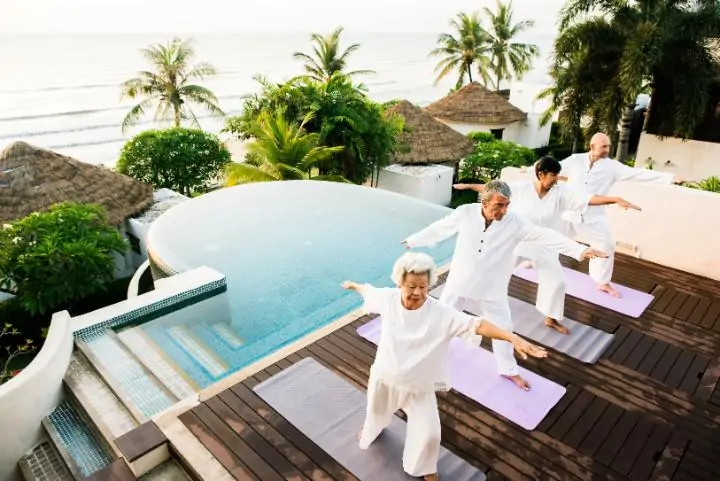
Wellness Tourism in Hotel
Table of Contents
ToggleAs wellness tourism continues its meteoric rise, it has become a defining trend in the hospitality industry. In 2025, travelers increasingly prioritize their physical, mental, and emotional well-being, seeking accommodations that cater to holistic health experiences. Hotels are responding by integrating wellness-focused offerings into their core services, transforming stays into rejuvenating and restorative journeys.
The Growth of Wellness Tourism
Several factors are fueling the growth of wellness tourism:
- Post-Pandemic Health Awareness: Travelers are placing a higher value on health and immunity, seeking environments that promote overall well-being.
- Work-Life Balance Concerns: Busy lifestyles and the rise of remote work have led to a greater need for escapes that rejuvenate both body and mind.
- Sustainable Living Trends: Many wellness offerings align with eco-conscious values, such as organic dining, nature-based activities, and mindfulness practices.
This growing demand is pushing hotels to elevate their wellness offerings beyond standard amenities.
In-House Wellness Programs
Hotels are incorporating a variety of wellness programs to cater to diverse guest needs. These programs provide immersive experiences that encourage relaxation, self-care, and rejuvenation.
- Yoga and Meditation Classes: On-site studios or outdoor spaces host guided sessions, catering to guests of all skill levels.
- Mindfulness Workshops: Sessions on stress management, breathing techniques, or digital detoxing appeal to those seeking mental clarity.
- Therapeutic Treatments: Guests can enjoy services like acupuncture, Reiki, or reflexology, delivered by skilled practitioners.
These programs emphasize balance and harmony, helping guests recharge during their stay.
Spa and Wellness Treatments
Luxury spas are central to the wellness tourism experience. Hotels are expanding their spa menus with treatments inspired by global traditions and cutting-edge innovations. Key offerings include:
- Traditional Therapies: Ayurvedic massages, Thai treatments, and hot stone therapy connect guests with ancient healing practices.
- Modern Techniques: Cryotherapy, hydrotherapy, and infrared saunas leverage the latest technology to enhance health and relaxation.
- Customizable Packages: Guests can personalize spa experiences with packages that combine treatments like facials, massages, and body wraps.
By offering world-class spa facilities, hotels position themselves as destinations for holistic well-being.
Healthy Dining Options
Culinary offerings play a vital role in wellness tourism, with hotels prioritizing nutritious, delicious, and sustainable dining options. Examples include:
- Farm-to-Table Menus: Sourcing local, organic ingredients reduces environmental impact while ensuring fresh, wholesome meals.
- Customized Diet Plans: Guests can request meals tailored to specific dietary needs, such as vegan, keto, or gluten-free.
- Superfood and Detox Options: Smoothies, antioxidant-rich dishes, and detox juices cater to health-conscious travelers.
Healthy dining enhances the guest experience, making it easier for them to maintain their wellness goals while traveling.
State-of-the-Art Fitness Centers
Fitness is a cornerstone of wellness tourism, and hotels are upgrading their facilities to attract active travelers. Modern fitness centers now feature:
- Advanced Equipment: Smart treadmills, VR-based workout systems, and resistance machines designed for a variety of training styles.
- Personal Training Services: Certified trainers offer one-on-one sessions to help guests achieve their fitness goals.
- Group Classes: Spin, pilates, and HIIT (High-Intensity Interval Training) classes foster community and motivation.
Some hotels also provide 24/7 access to fitness centers, accommodating guests with busy or irregular schedules.
Nature-Focused Activities
Connecting with nature is a key element of wellness tourism, and hotels are offering activities that immerse guests in their natural surroundings. Popular options include:
- Hiking and Walking Trails: Guided or self-guided tours through scenic landscapes promote physical activity and mindfulness.
- Water-Based Activities: Guests can enjoy swimming, paddleboarding, or kayaking in pristine natural settings.
- Forest Bathing (Shinrin-Yoku): A Japanese practice of immersing oneself in a forest environment to reduce stress and improve mental well-being.
These activities allow guests to unwind and reconnect with nature, enhancing their overall sense of well-being.
Wellness-Oriented Accommodations
Hotels are designing rooms and suites with wellness in mind, ensuring that guests can relax and recharge in their private spaces. Features include:
- Sleep-Focused Amenities: Hypoallergenic bedding, blackout curtains, and soundproofing create the ideal sleep environment.
- In-Room Fitness Options: Yoga mats, resistance bands, and guided workout videos offer convenience for active guests.
- Aromatherapy and Lighting: Essential oil diffusers and customizable lighting systems promote relaxation and improve mood.
These thoughtful touches make wellness an integral part of the in-room experience.
Retreat Packages and Immersive Experiences
Hotels are increasingly offering all-inclusive wellness retreats that provide immersive, multi-day experiences. These retreats might include:
- Detox and Cleanse Programs: Combining healthy meals, juice fasting, and spa treatments to refresh the body.
- Weight Management Retreats: Comprehensive plans with fitness sessions, personalized meal plans, and wellness consultations.
- Mind-Body Balance Retreats: Incorporating yoga, meditation, and mindfulness workshops for mental clarity and emotional resilience.
These retreats attract guests seeking transformative and life-enhancing experiences.
Collaborations with Wellness Brands
To enhance credibility and appeal, hotels are partnering with leading wellness brands. Collaborations might include:
- Exclusive Spa Products: Offering treatments featuring premium skincare lines.
- Fitness Equipment Partnerships: Equipping gyms with high-end machines from renowned fitness brands.
- Expert-Led Workshops: Hosting guest appearances by wellness influencers, nutritionists, or fitness experts.
Such partnerships enhance the perceived value of the hotel’s wellness offerings.
Technological Integration in Wellness
Hotels are adopting technology to further enhance wellness experiences, such as:
- Wearable Tech Integration: Guests can sync their wearable fitness devices to track steps, calories, and sleep during their stay.
- Virtual Wellness Sessions: Offering remote access to yoga classes or guided meditations for guests in their rooms.
- Wellness Apps: Hotel apps that provide resources like sleep guides, stress management tips, and workout videos.
These innovations make wellness accessible and convenient for all guests.
The Appeal of Wellness Tourism
For both hotels and guests, wellness tourism offers significant benefits:
- For Guests: A chance to relax, rejuvenate, and focus on personal well-being in a supportive and luxurious environment.
- For Hotels: Increased revenue from premium wellness services, longer guest stays, and stronger brand loyalty.
